
Back in 2015, VT looked at the possibility of a terrorist attack using specially designed EMP weapons, one that would take down the US power grid and put the US out of action for at least 3 years. Worst of all, China is the only nation that can replace key components of our power grid and, even then, that would take a very long time even under extreme emergency and this would certainly be such an emergency.
Now we are hearing rumors, let’s call them that, of an EMP attack that would interfere with the change of power expected after the election.
Taking America off the Grid
…by Ian Greenhalgh
Trying to predict future events is an often unrewarding pursuit fraught with dangers, rarely are predictions fully accurate, more often, they are spectacularly wide of the mark; for this reason, speculation rarely benefits anyone.
By Jeff Smith with Gordon Duff
With the recent use of neutron weapons in Yemen and the threat of EMP terrorism against the United States a reality, VT is publishing some of the limited material on these weapons from the archives of the US Department of Energy, Los Alamos National Laboratories.
However, with Dick Cheney’s chilling warning/threat of a ‘far deadlier nuclear 9/11’ in mind, we couldn’t resist indulging in a little speculation as to the possible target of this future attack.
Of course, we aren’t the only ones who have considered the issue of likely targets for a ‘terrorist’ attack.
In 2007 , the U.S. Department of Homeland Security commissioned a report by the National Research Council into the vulnerability of the U.S. Power grid to terrorist attack. However the D.H.S. decided at that time that the report would be classified in its entirety. After a formal request from the Research Council for an updated security classification review, the report was cleared for public release in Fall 2012.
The report makes it clear that the U.S. Power grid is highly vulnerable to attack. There are 30 substations in the U.S. that play a critical role in the nation’s grid operations; the report said that if any nine of them were taken offline, the U.S. power grid could suffer coast-to-coast blackouts lasting 18 months or more and costing the nation billions of dollars to repair.
You can read the full report entitled ‘Terrorism and the Electric Power Delivery System’ here.
With this disturbing scenario in mind, we asked the same brave folks at Sandia Labs who chose to release the astounding news about the nuclear weapons used on 9/11 if they had any insight into the possibilities of such an attack. The result was the release to us of more highly-classified information every bit as astounding and chilling as the 9/11 nuclear data.
Q: Have case studies been carried out that examine the possibilities for an attack on the US power grid?
A: Many studies have been done on EMP damage to the US power grid.
Only a very high altitude air burst above 1 megaton would work. Requires a ICBM to work. Russia or China only and a first strike use only.
All other smaller burst would be tactical in effect only. Can be done by terrorists.
There are two types of attacks.
The first is for long term damage, and the second is to produce temporary outages in targeted cities only. Such an attack would only require a low-yield weapon detonated below 30,000 feet in a jet, or a ground burst from a carrier van in order to take out a power plant, dam, or transformer switching yard.
Unless you are directly below the blast, air bursts only blow fuses and damage power and phone lines. This damage can easily be repaired in a few days or weeks, much like after a hurricane or tornado hits. Its effects are short term and short-ranged.
Long term damage can happen to infrastructure, and is more permanent. You have to replace the transformers and power plant equipment. It can take up to several years just to replace a power plant ETC. These parts are custom built, and they are not kept in stock.
Q. Is there a type of nuclear weapon that is optimized to create the largest possible EMP? Would this be the type of weapon best suited to destroying electrical and electronic infrastructure such as the US power grid?
A. There are three types of EMP attacks possible. The one everyone knows about is the high altitude EMP burst. It is horizontal in polarity, and it is designed to knock out power lines, power transformers, phone lines, AM and shortwave radios. It mainly works on long line power cables that are above ground and running parallel to the earth’s surface. It is detonated at high altitude, usually above 45,000 feet, and it is a line-of-sight weapon, with a maximum range of 300 to 600 miles, depending on burst height. The major damage is limited to an area just below the fireball’s burst location.
Its EMP effect very rapidly decreases in strength with range. It will also knock out the ionosphere for up to several hours making long range AM band and HF communications difficult or impossible. This is intended for knocking out command and control structures. Frequencies above 30 to 60 MHz are poorly affected. 75% of the pulse is well below 30 MHz in frequency, with the majority of the pulses being between 15 and 300 KHz in range.
In any EMP blast, any wire that is less than 10 feet long will absorb very little EMP energy. So it will not disable your car unless you are directly below or near the blast. Cell phones, TV, and FM radios are pretty much immune from this kind of attack due to the very short wavelengths involved.
B. The surface burst EMP effect is vertical in polarity, and it is very short-ranged, with the majority of the energy being shot straight up in to the atmosphere. It can act as a directed energy weapon when the burst is confined into a channeled metal wave guide, such as on 911. When confined in such a structure, it will use any conductive metal as an energy conduit to transfer the electromagnetic energy into.
In the surface burst mode, the electromagnetic pulse does not radiate, as in the high altitude burst mode. Most of the energy is trapped in the induction and near field zones of the blast. Its effect is usually less than 3 miles, and the energy is usually centered well below 3 MHz in frequency. Half the energy produced will be in a magnetic form and not in an electromagnetic form, i.e. as in a radio wave.
This magnetic pulse is very good for enhancing the thermal effects of the weapon by very rapidly heating up and melting very thick metal objects such as car engine blocks and steel beams. The effect is very similar as to how an induction cooker works.
C. The underground burst is the 3rd mode of EMP weapons. In this mode almost all of the energy produced is absorbed by the earth. Its main function is in going after underground bunkers, structures and rail or oil pipelines. It is usually referred to as a bunker buster. Its main effect is in producing a large magnetic pulse in the ground for destroying or damaging equipment by means of thermal magnetic induction. It produces a magneto-hydrodynamic process as its mode of destruction. It is good for taking out dams, power plants and well-shielded nuclear reactors.
D. In order to effectively use it on the US power grid, [you have to ask] what is your intention. If you only want to temporarily knock out the power and disrupt communications for only a few days to a week or two, then a high altitude air burst would be used. This would be a precursor by a first strike nation only.
More than one 300-kiloton or larger weapon would be needed, unless your only intention was to use it on the east or west coast.
The majority of the damage would be limited to a few hundred miles around the affected area, such as WDC, NYC, Chicago, Atlanta, Dallas, Houston, Phoenix, LA or San Francisco. It would have to be detonated above 45,000 feet. This would imply using an ICBM.
The main damage would be in blowing out circuit breakers and producing very large power transits overloading the capacity of the power grid to manage it, effectively tripping safety circuits. This is called “load sloshing”, and it is what took out power to the northeast power grid years ago.
E. A low altitude (under 30,000 feet) nuclear burst under 20 or 30 kiloton in size will be limited to line of sight range. This is usually about 30 to 60 miles max for a low level burst. Damage will be limited to blowing out circuit breakers, transformers, motors and phone lines, with the majority of the effect being within one to six miles from the center of the burst.
F. In a ground burst as used by a terrorist organization, a very small nuke enhanced for EMP use will only be effective for less than a mile or two, as seen on 911. The range is extremely limited, and it is effective only against large fixed infrastructures, such as power plants and transformer switching yards.
By going after unprotected power plants and associated switching yard equipment such as very large transformers the damage can be quite severe.
It can take years to replace equipment like this. Most of it is now only made in Asia and you have to wait years to get replacement generators and transformers made. GE and Westinghouse off-shored this type of manufacturing to Asia years ago. It is the soft underbelly to the US power grid. No spares.
The former head of Homeland Security, Janet Napolitano, warned about this before leaving office. For a terrorist group, this is the easiest option outside of dropping power lines. Just park a white moving van with a EMP weapon loaded inside of it next to a major transformer sub station. Light the fuse and run.
Q: What do you consider to be the most likely target of the ‘far deadlier’ terrorist attack that Dick Cheney recently warned about?
A: It just means more dead bodies. City size vs 9/11 size. As on 9/11, look for the rats abandoning the ship first. When you see all of the ship’s rats carrying their cheese down the anchor rope, you know something is up.
Clearly, the folks at Sandia have studied the possibility of attack on the power grid in depth; much of their info correlates exactly with the National Research Council report. If the U.S.’ top nuclear weapons laboratory and the academics at the Research Council share the same concerns for the same reason, then we must pay attention.
The most significant part of the Sandia information, in terms of it being a possible scenario for a ‘terrorist’ attack or rather, a false flag that can be blamed on terrorists is this sentence:
For a terrorist group this is the easiest option… Just park a white moving van with a EMP weapon loaded inside it, next to a major transformer substation. Light the fuse and run.
So, if war with Iran or Syria or some other unfortunate target of Zionist aggression is desired, and they chose to repeat the successful 9/11 formula of false flag ‘terrorist’ attack to provide justification, then the US power grid must be considered among the prime targets.
The terrible implications of such an attack are starkly laid out in these sentences:
It can take years to replace equipment like this. Most of it is now only made in Asia and you have to wait years to get replacement generators and transformers made. GE and Westinghouse off-shored this type of manufacturing to Asia years ago. It is the soft underbelly to the US power grid.
Just imagine the damage done by two years without power… Scary thoughts.
The History of Nuclear Weapons Design 1945-2015 (Banned by National Security Letter-Ignored by VT)
by Ian Greenhalgh with Jeff Smith
In the last year we have covered a number of incidents where nuclear weapons have been used; from exposing the truth about the nuclear nature of the destruction of the WTC on 9-11 to being the only media outlet to cover the nuclear explosions in China.
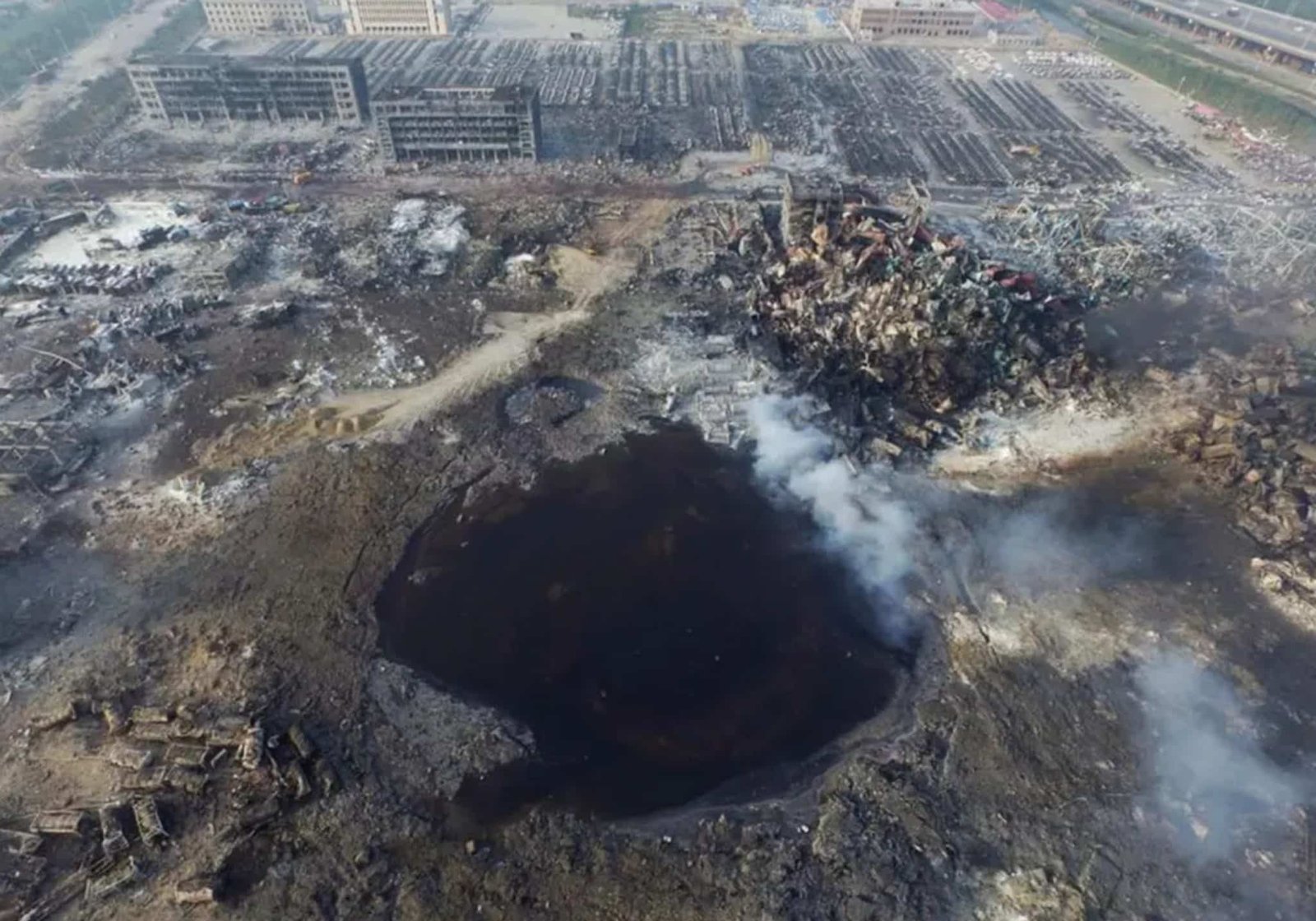
In the minds of most people, a nuclear weapon is a large device carried on the tip of an ICBM or carried in the belly of a huge bomber aircraft that when deployed produces a colossal explosion and spectacular mushroom cloud just like all those terrifying 1950s newsreels.
However, this is no longer the case – nuclear weapon design is several generations in advance of the bulky devices of the Cold War and today, a wide variety of types of nuclear weapon exist and they come in all sizes from the smallest ‘micro nukes’ with yields measuring in hundreds of tonnes of TNT equivalent up to truly monstrous two and three-stage bombs with yields of many millions of tonnes of TNT (megatonnes).
Are lies censored? You can only see VT videos when recorded off a computer screen:
The megatonne class bombs have never been deployed in anger; if they had, there would be no possible way to keep it a secret – the devastation and fallout would be on such a grand scale as to be impossible to hide. However, the sub-kilotonne mini and micro nukes have been used many times, both in false flag ‘terrorist’ attacks like 9-11 and OK City and in military conflicts in countries such as Iraq, Syria and Yemen.
The small yield and limited destruction of these mini and micro nukes means it is possible to keep their use secret; especially when the media are compliant and willfully ignore any and all instances of their use. The willingness of several players to use these diabolical weapons should send a chill down the spine of every sensible person – we are living in a new nuclear age far more dangerous and deadly than the previous Cold War-era with its balance of nuclear power held in check by the terrifying concept of Mutually Assured Destruction.
Now that advanced nuclear weapons have become part of the playbook of modern conflict it becomes important to understand something about these weapons; to learn how their characteristics and effects so that it becomes even harder to keep their use secret.
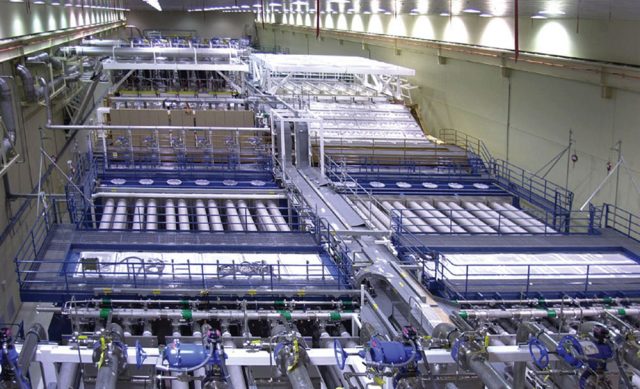
In the original first-generation solid core fission device, developed during World War 2 and known as ‘Fatman’; a solid core plutonium pit was compressed to less than 75% of its original size in order to create a critical mass. In this 70-year-old design, the fission process was bound by the use of high yield explosive compression.
This first atomic weapon used about 5,000 lbs of explosives and 32 shaped charges to shock compress about 10 KG of plutonium from its molecular delta state into its alpha state, massively increasing its density per cubic centimeter.
By doing so it created a neutron means a free path of about 35 centimeters or less in length and it was able to just hold it all together long enough in time to produce about 80 to 100 generations of neutron multiplications. Thus forming a super critical mass that produced an estimated yield of about 15 to 20 KT of TNT.
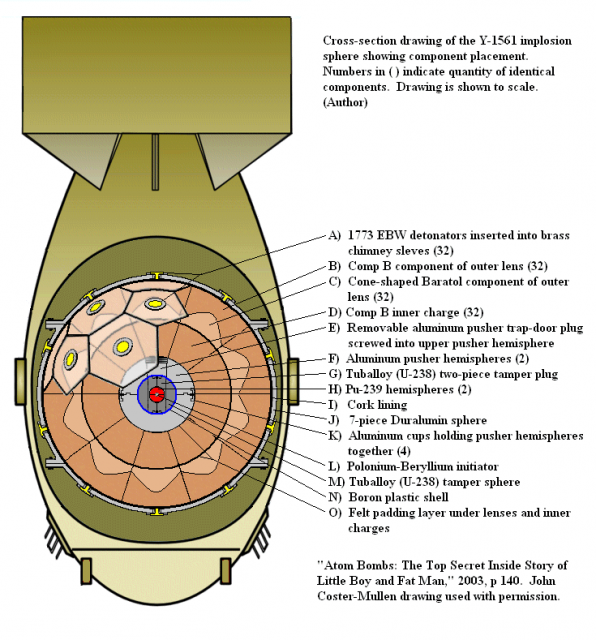
35 centimetres or about 14 inches is the average distance traveled by a free neutron before it strikes another atom of plutonium and splits it, causing a nuclear chain reaction to occur. The distance traveled by a neutron, along with the time required to travel this distance (also called the assembly time) is the key to forming a critical mass in any fissile material.
If the assembly time is to slow or not enough neutrons are generated in time, the weapon will fizzle producing a much lower yield. Usually at about 5 KT. Verified by testing during the 1950’s.
However if it gets past the first 56 neutron generations it will still go bang, and if it reaches about 80 neutron generations it will explode at full yield. Any new neutron generations added above the first 80 generations, (that occur before final disassemble of the core occurs), will simply add to the efficiency and yield of the device. All of this activity takes place in less than a few microseconds and the neutron chain reaction producing the explosion is over before you see the first flash of light.
The high-temperature plasma fireball and shock wave that is created during the explosion is simply the remnants of unburned fissile material and its isotopes produced during the fissioning of the uranium or plutonium atoms rapidly undergoing thermal expansion in the atmosphere until cooled. This thermal expansion and cooling of hot gases form the classical mushroom cloud.
The ratio of nuclear fissile material that is required to produce a certain blast size is based on a ratio of about 1 KG of PU 239 per 1 to 2 kilotons of explosive power depending on implosion efficiency. As the compression of the fissile material is increased, the amount of fuel required to create a critical mass is reduced. Using a neutron tamper and reflector will also help reduce the size by up to half.
Currently, a compression level of up to 4 to 1 is the maximum amount that can be achieved with current explosive technology. This is enough to reduce the critical mass to about 2.5 kilograms with a lower maximum explosive yield of about 2 to 5 kilotons in size.
If a proper neutron moderator is used, lower values can be achieved resulting in a much smaller blast, but a much longer fireball burn time. The minimum tested amount was publicly set at about 800 grams or about 1 lb of PU239, producing a yield between 10 and 100 tons of explosive force. This was done back in 1958, and it was designed by the physicist Ted Taylor. It became the W-58 weapon series of small artillery shell weapons.
In the original WW2 Fatman weapon design, about 10 KG of plutonium was used, and only about one to two kilograms of PU was fissioned off before the final dissemble of the nuclear core occurred. The other 80 to 90% of the un-fissioned material wound up being fallout.
Solid core fission devices are very inefficient due to the fact that about 90% of the fissionable material is only used as a neutron multiplier, and it is only the last 10 to 20% of the outer nuclear core that produced the explosive blast effect.
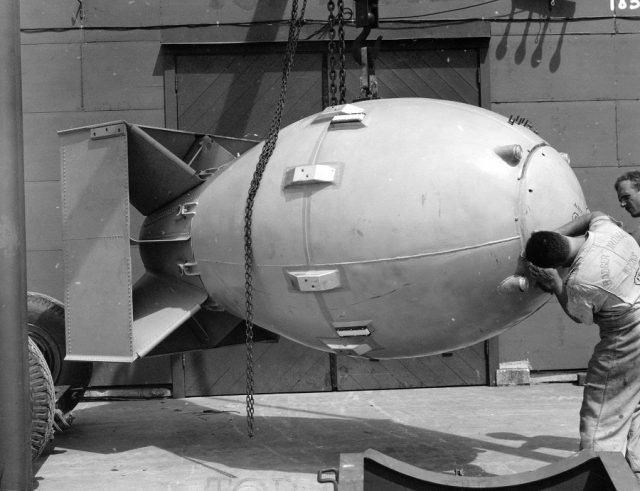
This is why solid core nuclear weapons are no longer used. They are extremely inefficient. They are very large and bulky in size and they require a sophisticated multipoint, electronically controlled, shape charge, implosion system to function properly and they create large amounts of fallout.
Even thou there were no civilian personnel immediately killed by fallout at Hiroshima and Nagasaki, this was due to the fact that all casualties were caused by prompt radiation exposure from the original blast and follow on radiation poisoning.
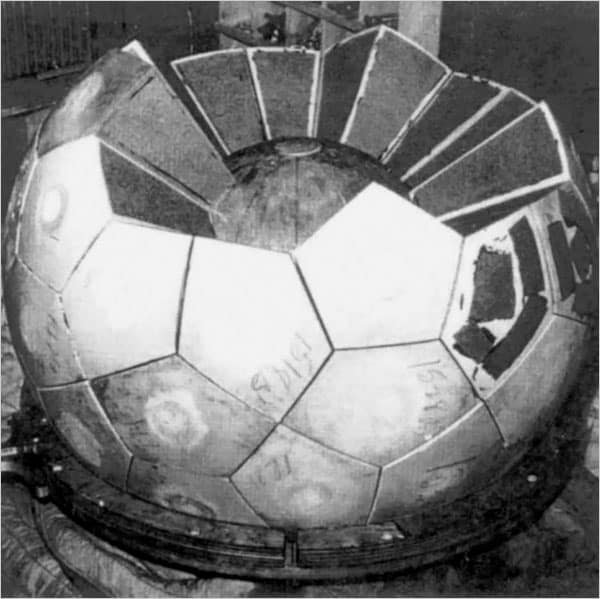
Solid core implosion systems using pu-239 also require an inherently fast assembly time due to prompt radiation problems with pu-240 impurities contained within the plutonium fuel. This problem gets worse as the plutonium ages, eventually forcing the retirement of the nuclear pit or core. This is why we now have over 6,000 surplus plutonium pits held in surplus cold storage.
After about 16 to 32 years, the pit has to be remanufactured, and it is a costly and toxic process. So it was deemed to be cheaper and easier to just keep making new pits and worry about recycling the older junk warheads later. However with U-235 uranium-based weapons and hollow-core boosted fission-fusion weapons, you do not have this problem. This is why all modern nuclear weapon designs since about 1960 use this newer third-generation process.
First off U-235 based weapons do not have an aging problem; they are good for over 100 years and then some. The only reason why they chose the much more expensive and toxic plutonium route was simply that at the time back in 1945 they could produce 4 times more PU-239 than they could produce enriched U-235 uranium, meaning more bombs faster. The WW2 plutonium production rate after January of 1945, was set at 1 bomb per every 10 days of reactor operation, versus 1 bomb every 30 to 45 days with enriched uranium production.
If Japan had not surrendered, they were going to drop one bomb on Japan every two weeks until there was no Japan left. However, with the smaller, cheaper, and more easily produced uranium-based weapons that required no reactors whatsoever to produce, it was too little too late. Plutonium won the weapons race, and this remained the case all the way through the Cold War with Russia and China.
Now 70 years later, someone has to clean up the mess that Oppenheimer, Teller and Groves made. Fortunately for them and probably for us, they are long gone, so they don’t have to clean up the mess that they made. The US alone has over 100 tons of enriched u-235 uranium that is good for 100 years more as weapons-grade fuel, plus more than another 100 tons of weapons-grade plutonium pu-239 sitting in cold storage just rotting away and radioactive for another 10,000 years.
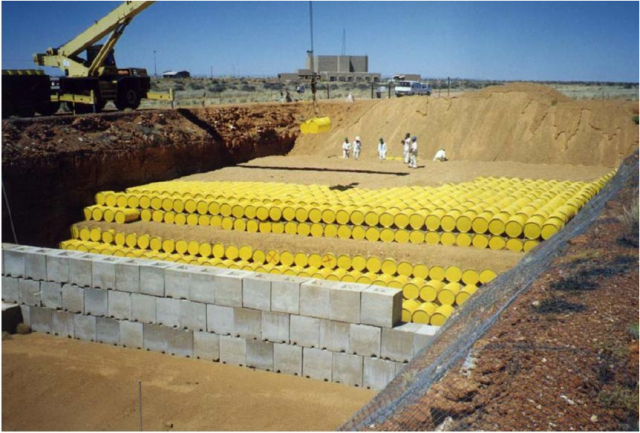
Fortunately someone sane recognized this and finally stopped production of replacement weapons-grade fuel by shutting down all of the production reactors that made this stuff. 6,000 surplus warheads is more than enough.
The hollow core pit design and third generation weapons
Second generation nuclear weapons were the so-called massive hydrogen bombs of the ’50s and 60’s deemed obsolescent by better and more accurate missile guidance systems, multiple reentry vehicles and newer miniaturization technologies that came online. Third generation weapons were the miniaturized designs using hollow-core and boosted fission technology during the 60’s and 70’s allowing for much lower yield weapons and the so-called “Dial-A- Yield” designs.
Fourth-generation nuclear weapons were produced during the Reagan Star Wars program of the 1980’s thanks to Mr. Teller and were basically what is called “directed energy” or “enhanced energy” weapons “neutron, X-ray, Gamma-ray, EMP” bombs, including super lasers. Fortunately, none of it ever worked as sold, but it did vastly increase our technological knowledge and that has now lead to the creation of the latest fifth-generation weapons, which are still clouded in much secrecy.
As far back as the mid-1950s, work began on the first levitated pit designs that placed an air cushion between the inner and outer core of a single-stage plutonium-based implosion design. This air-core doubled the shock wave velocity of compression allowing for a bigger bang for your buck. Forty-plus kiloton weapons could now be made with simple, single-stage implosion designs, doubling existing yields. As ICBM’s took over the job from the B-52 and the airdropped weapons which were being deployed at the time, miniaturization of nuclear weaponry rapidly kicked in.
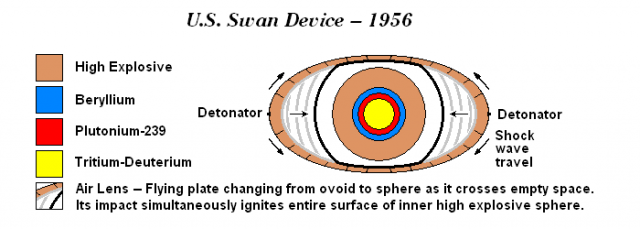
Two techniques for nuclear miniaturization were devised. The first simply just shot two slugs of uranium U-235 into a neutron-rich target called an urchin or neutron generator. When the two subcritical masses of uranium collided with the neutron-rich urchin and axially compressed by explosives a critical mass was formed and bang.
This reduced the size of a uranium-based gun implosion weapon system from 10 feet down to 3 feet and only 18 inches in diameter. It was sweet, safe, simple, and very reliable. It also reduced the weight from 5,000 lbs to less than 1,000 lbs. A big deal back then.
An entire series of primary fission weapons have since been based on this basic design, including the B-61 series still used today. By simply varying the implosion velocity the yield of the weapon could be changed to a lower number. This was an early “dial a yield” design.
Later after many tests, it was determined that the amount of fissile material could be reduced to a very small amount and the design would still work. This was the basis of the first mini or micro nuke designs of the 1960s and ’70s mainly used at the time as first stage nuclear triggers for much larger hydrogen bomb designs.
Boosted fission
After the levitated pit and “two-point” uranium, gun-based implosion systems were worked out in the late 1950s more advanced two-point and even single point plutonium-based spherical implosion systems were invented. These systems basically used the inside out principle of the original H bomb design.
By simply filling a hollow core spear made of fissionable material either uranium or plutonium with a neutron based boost gas such as deuterium or a solid such as lithium-6 that turns into deuterium when properly compressed, you get a miniaturized hydrogen fusion-fission-fusion bomb design or weapon.
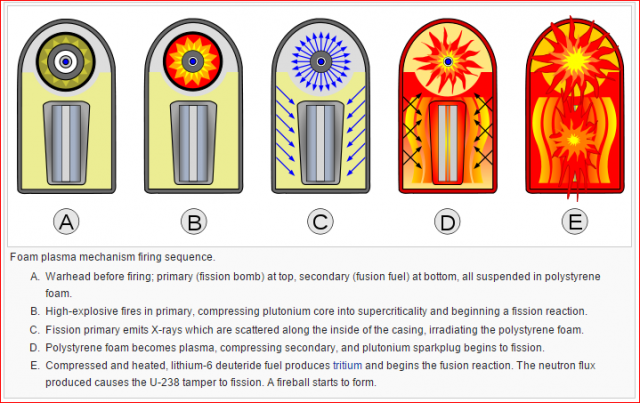
This opened Pandora’s box for all current miniaturized nuclear weapon designs since then and in the future. It also eliminated the minimum critical mass problem with the older WW2 era solid core plutonium pit designs and pre-detonation timing problems. 32 point compression was now down to two or even single point compression making weapons designs so small that they could fit in a 155 mm artillery shell.
The average size of a nuclear primary is now down to less than 6 X 12 inches or less with verified yields as low as .05 kilotons. W-48, W-58, B-61 etc. That’s equal to about 50 tons of TNT, but large enough to set off a fusion secondary of a much greater size if needed. look it up on Wikipedia if you don’t believe me.
Due to the newer inside out boosted gas compression systems coming online in the 1970s, a much environmentally cleaner (or greener) burning weapon came into being with fallout issues becoming almost nil. These newer 3rd, 4th, and 5th generation hollow-core boasted weapons designs produce very little fallout, if any at all, due to the fusion process consuming almost all of the fissile material during detonation. Low-end yields of very high efficiency can be easily created with no minimal critical mass problems to overcome.
Their efficiency is so high that they only require one-tenth of the amount of fissile material that previous designs needed. Even lower grade blends of nonweapons grade plutonium (less than 92% pure) will work just fine. So any nation with a nuclear power reactor and a uranium or plutonium chemical separation program could easily make them. IE North Korea, Iran, Germany, Japan etc. Hydrodynamic implosion testing is minimal in very small devices such as this in order to get one to work. The only hard part is the metallurgy and the chemical separation process.
Mini and micro nukes – science fiction or science fact
The so-called “Blogging Wars” or debate on the internet as to whether or not these newer 5th generation “subcritical burn” nuclear weapons exist or not is a touchy issue to deal with. Since there is no physical proof as to their existence and vicious debate in the alternative media about them being recently used in the middle east, Yemen, Ukraine and most recently in China, it’s hard to prove either way. The key argument by the “Nay-Sayers” and the “Grammar Nazis” is the lack of fallout. This can be explained.
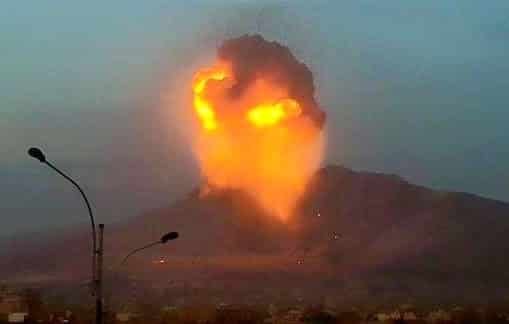
In the older first-generation weapons systems dating back over 70 years ago to the WW2 era, only 10% of the fissile material was consumed in the original explosion with over 90% being leftover as fallout. They were very dirty weapons as compared to today. This is the concept that has set into the public’s mind ever since.
The 90% of unburned fuel was simply used by the weapon as a neutron amplifier or multiple and nothing else. It added very little to the total explosive yield. Only the outer 10% of fissile material was actually used to make the explosion. This is why they were so dirty.

In the newest 5th generation devices the uranium or plutonium fissile content has been drastically reduced by as much as 90% only leaving enough fissile material needed to ignite and trigger the internal fission-fusion-fission reaction of the deuterium boost gas. In this process, almost all of the fissile material is totally consumed, producing almost no detectable traces of fallout, as compared to the older designs from the WW2 era.
Due to this advantage in “nuclear stealth technology”, almost any large scale explosion greater than 10 tons or more in TNT explosive power can now very easy be passed off as a conventional explosion. Remember, any explosion that leaves a crater greater than 6-feet wide or deep requires a molecular mass explosion of TNT that is greater than 4,000 lbs in weight or two tons of explosives. Most cars, small trucks or jet fighters cannot carry a weapon any larger than this in explosive power.
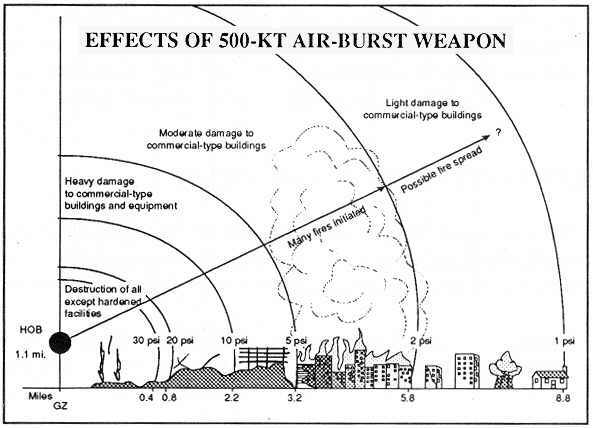
So unless you have a B-52 or a B-1 or a B-2, forget it. It has to be a mini-nuke until proven otherwise. Just because there is no fallout doesn’t mean that it wasn’t a mini or a micro nuke. Look at the blast photos. A picture is worth a thousand words. Was there a bright instantaneous flash?
Was it a single point or multipoint blast? Was there hydrocarbon residue left behind? Were secondary explosions involved? Was there evidence of very high temperatures and massive thermal damage involved? Were there incinerated or missing bodies involved? Was there an earthquake with a rapid unnatural spike registered on the seismometers?
The list just goes on and on as to what to look for if you know what to look for. Glasstone’s 1958 book “The effects of nuclear weapons” is a start for those who really want to know, but it is over 55 years old and it has not been updated to cover anything new since solid core weapons designs were invented 70 years ago. There is no new “bible” on the newer weapons designs that is still not classified for a reason. They don’t want you to really know.
So the “Nay-Sayers” base their arguments on outdated 70-year-old information as to how nuclear weapons use to work back in 1945. Well, we have come a long way since then baby. Allegedly we even landed on the moon?
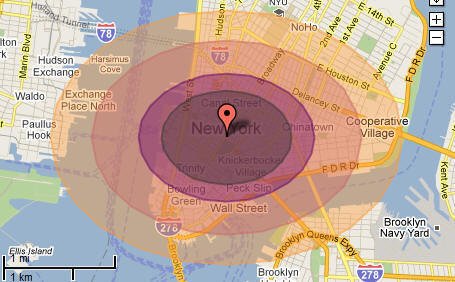
Nuclear Bunker Busters and how they really work
Any nuclear blast can be shaped or modified in the type of energy it releases. Either as Heat, Blast effect, X-rays, Gamma-Rays, EMP pulse, or just pure neutrons, etc. Any of this radiation can be directed in any direction or none at all. This was the basis of the 1980’s Star Wars program, exotic nuclear weapons, and super Lasers at work.
A nuclear blast can be directed in any direction acting as a nuclear shape charge, and it can be focused just like using a standard molecular anti-tank TNT based shape charge. A 1 kiloton B-61-11 nuclear bunker-buster will blast (melt) a hole 10-feet wide and over 1,000 feet long into solid granite. Larger versions will make even a bigger hole in the ground. They do not bury themselves into the bedrock and make a big crater. This is a common public misnomer on how they work.
They melt the bedrock with a nuclear thermal plasma jet that is over 1 million degrees in temperature. When this hot plasma hits the underground command center or bunker, everybody inside the bunker will be instantaneously vaporized from the plasma jet. With higher yield B-61 weapons, any bunker that is less than 3,000 feet deep can be hit. This includes NORAD in Denver Colorado, etc.
No modern underground bunker complex less than 3,000 feet deep can survive a hit from one of these new bunker busters. These tests were conducted as far back as the early 1960s in Nevada proving ground and were covered up as simple underground tests.
For further info on how these newer weapons work; see Nuclear physicist Ted Taylor’s book “The Curve of Binding Energy” by John McPhee, first printed in 1974. It covers in greater depth as to how these newer weapons work and how they were used on 911 to take down the World Trade Center.
Ted wrote this prediction of their use on the WTC and in Fukushima Japan way back in 1974. He states that a single directed-energy nuclear weapon (a small bunker-buster) placed in the lower basement of the central core elevator shaft area of the twin towers, as small as 1KT, producing a nuclear plasma jet, directed upwards 1,000 feet with no blast effects detected from the outside of the building and that this plasma jet would vaporize and melt the entire central core of the building dropping it into the ground.
As seen on 9-11.
Remember this prediction was in 1974.
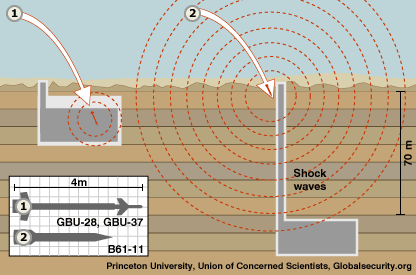
These newer 5th generation weapon designs are the anarchist “21st century” favorite toys of mass destruction. By covertly hiding their existence away from the general public and secretly using them in stealthy nuclear-based guerrilla warfare attacks on undesirable persons, governments or countries — such as the Saudi’s use of a small tactical nuke on Yemen or most recently in China — with these new weapons of “very small” mass destruction (tiny nukes for tiny minds), no non-nuclear possessing government can properly defend itself from this form of covert state-sponsored guerrilla warfare.
The real issue is not “whether or not they do exist”, but who is really using them against whom, and why?
9-11 Syllabus and VT Nuclear Education Series – 2015
- VT Nuclear Education: The History of Nuclear Weapons Design 1945 to 2015
- VT Nuclear Education: The Uranium Hydride Bomb
- VT Nuclear Education: Subcritical and microfission explosives
- VT Nuclear Education – Freon and the Hohlraum
- The Secret Nazi role in Building the Atomic Bomb
- How the Nazi A-Bomb Worked
- VT Nuclear Education: Critical Mass
- VT Nuclear Education: Laser and Nuke Weapon Calculator
- VT Nuclear Education: Germany
- 9/11 Science: Craters and Explosive Damage
- Neutron Bombs and Other Toys
- NEO: Building Nuclear Case Against Saudis
- VT Nuclear Education: The Secrets of EMP Weapons
- VT Nuclear Education: Explosive Properties of Reactor Grade Plutonium
- Nukes on Yemen, Confirming Proofs: Yield Estimation from Illumination Time
- Nukes on Yemen, Confirming Proofs: Introduction to Nuclear Operations
- Nukes on Yemen-Confirming Proofs: Calculating Nuclear Blast Yield from the Flash
- How Israel Was Busted Nuking Yemen
- Saudis Have Israel Nuke Yemen for Them
- VT Warning of EMP Plot Confirmed by Guardian
- VT Nuke Education: Thorium Warnings
- VT Nuclear Education: CIA/Iran Trial and more disclosure
- NEO – CIA Torture Report Ties Cheney/Bout to 9/11 Nukes
- The DOE Defends Nuclear 9/11
______________
9-11 Syllabus and VT Nuclear Education Series – 2014
- Too Classified to Publish: Bush Nuclear Piracy Exposed
- Nuke Cancer from 9/11 Revealed
- 9/11 NUKE DEMOLITION PROOF: Firefighters Radiation Cancers “Off the Scale”
- Doc Submitted By Russian Intel
- Constructing the Nuclear Child
- VT Nuclear Education Series
- Nuclear Education Series: Dimona Classified
- VT Nuclear Terrorism Education Series
- VT Nuclear Education: Undeniable Proof of 9/11 as a Nuclear Event
- VT Nuclear Education: As the Hammer Drops
- VT Nuclear Education: Mossad/N. Korea Links, MOX
- Nuclear Roundtable: America’s Nuclear Arsenal
- Officials Cite “Thermo-Nuke” in 9/11 Demo
- VT Nuclear Education: Fission Based Thermobaric Weapons
VT Supporting Material on 9/11, Nuclear Physics and Disclosure Issues
- VT Nuclear Education: Antigravity
- NEO – Mini Nukes and M16: The Economy of War (must read)
- VT Nuclear Education: Nukes in Iraq, Confirmation UPDATED
- VT Flexing Its Nuclear Muscle (must read)
- Nuclear 9/11 Revealed: Theories and Disinformation, the Misguided and the Inhuman (must read)
- VT Nuclear Education: Tactical Nuclear Warfare (must read)
- VT Nuclear Education: Early Reactors
- IAEA investigators: Audit reveals US, not Iran the problem (must read)
- VT Nuclear Education: History of Mini-Nukes (must read)
- VT Nuclear Education: Answering the Hype (must read)
- VT Nuclear Education: A Funny Thing Happened on the Way to the Atom Smasher (must read)
- VT Nuclear Education: LENR Neutron Distribution
- Einsteins Theory on Magnetic Buoyancy
- VT Science: Fuel Cell Technology
- VT Science: The Farnsworth Fusor
- VT Science: HAARP
- Fusion: Junk Science For Rubes
- NEO – Nuclear Threats Enter the Mainstream (must read)
- VT Science: NASA’s Low Energy Fusion VooDoo/DooDoo
- The Connection Between Aurora and Black Triangles (Redux)
- Jeff Smith on Upcoming Able Danger Leak
- VT Nuclear Education: Japan
- VT Nuclear Education: Detonations and Deceit
- 9/11 Hokum: Deconstructing Christopher Bollyn and Steve Jones
- Why are the Commanding Generals being Sacked?

AUTHOR BIOGRAPHY
Ian Greenhalgh is a photographer and historian with a particular interest in military history and the real causes of conflicts.
His studies in history and background in the media industry have given him a keen insight into the use of mass media as a creator of conflict in the modern world.
His favored areas of study include state-sponsored terrorism, media manufactured reality and the role of intelligence services in manipulation of populations and the perception of events.
Editing: Jim W. Dean
ATTENTION READERS
We See The World From All Sides and Want YOU To Be Fully InformedIn fact, intentional disinformation is a disgraceful scourge in media today. So to assuage any possible errant incorrect information posted herein, we strongly encourage you to seek corroboration from other non-VT sources before forming an educated opinion.
About VT - Policies & Disclosures - Comment Policy

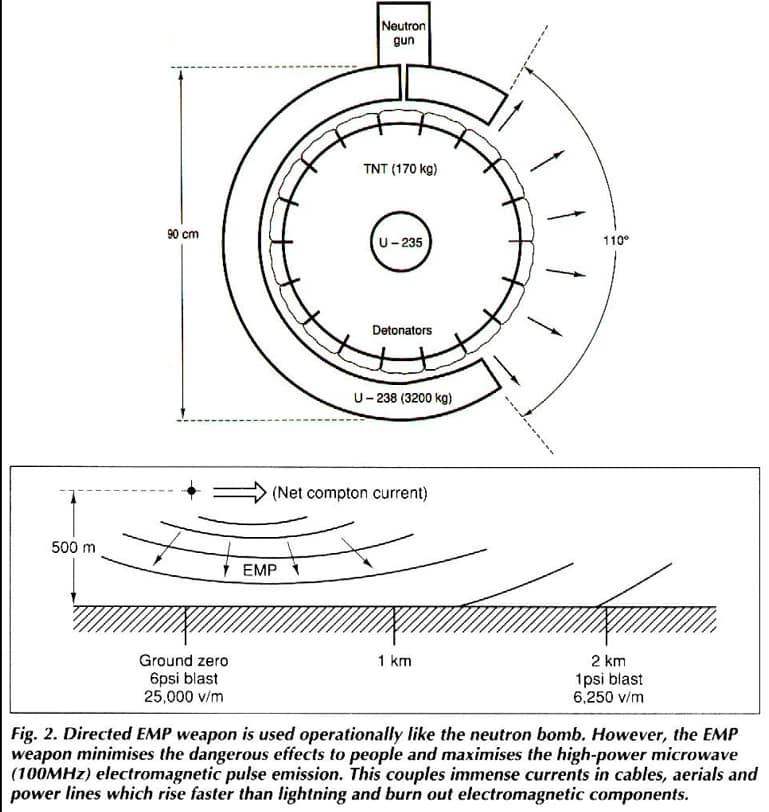
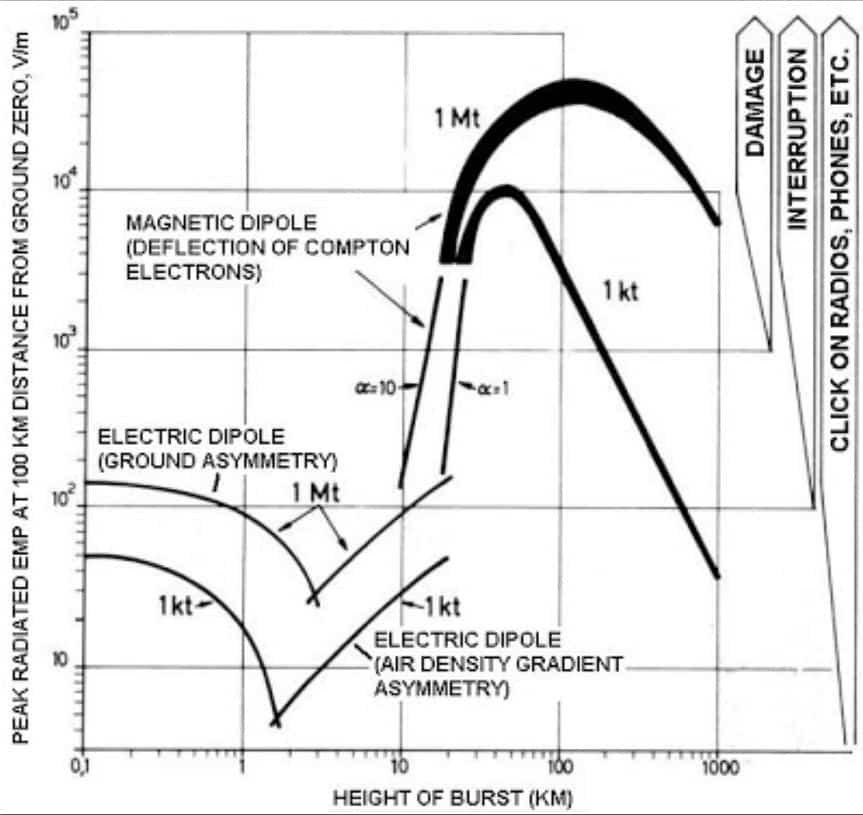
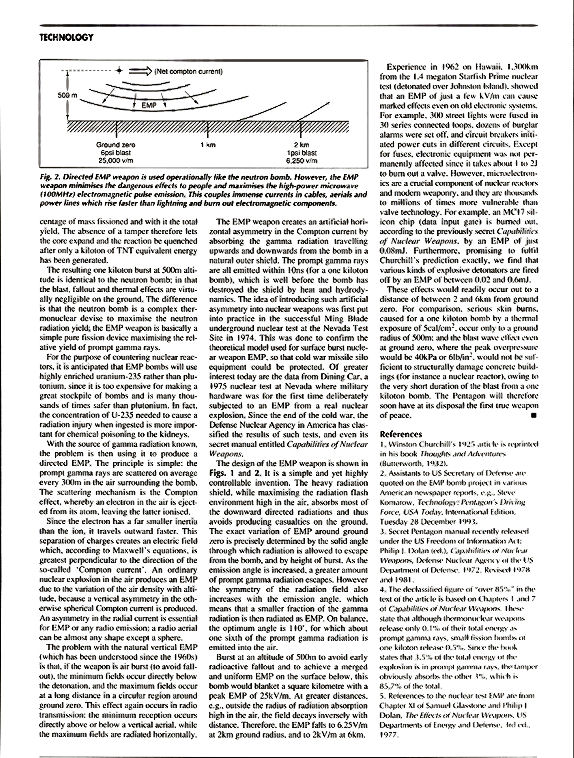
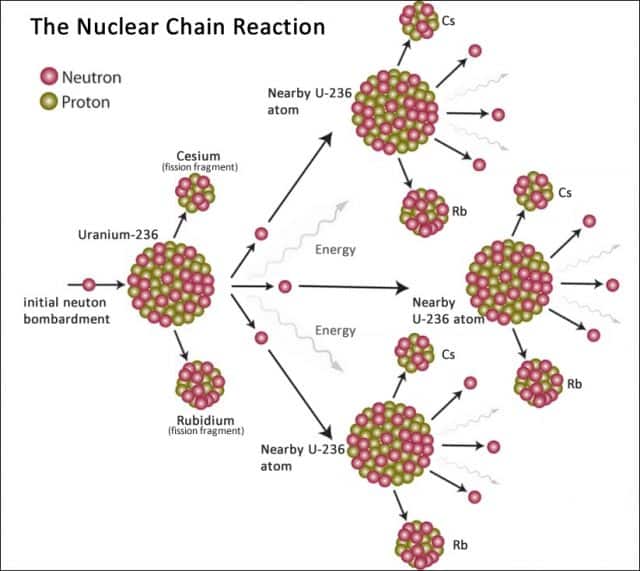
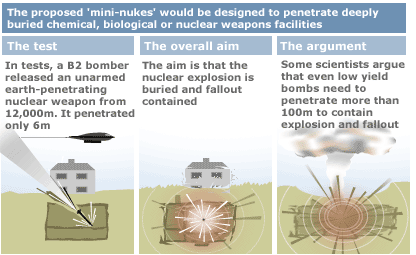



I am surprised there aren’t more comments. I take any talk of EMP chatter seriously. But I am more concerned about China than of other actors.
Good to see you back in action, Ian. Hope you and your dad are surviving the COVID-19 bioweapon attack on the UK. In reference to the above article, how many different ways to die are needed before you’re dead?
Comments are closed.